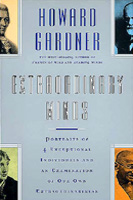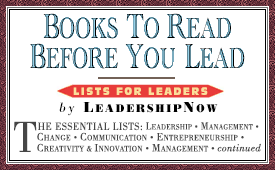
|
 |
Extraordinary Minds Howard Gardner 
Format: Paperback, 192pp. ISBN: 9780465021253 Publisher: Basic Books Pub. Date: Reprint edition April 1998 Average Customer Review: For Bulk Orders Call: 626-441-2024 Description and Reviews From The Publisher: Fifteen years ago, psychologist and educator Howard Gardner introduced the idea of multiple intelligences, challenging the presumption that intelligence consists of verbal or analytic abilities only—those intelligences that schools tend to measure. He argued for a broader understanding of the intelligent mind, one that embraces creation in the arts and music, spatial reasoning, and the ability to understand ourselves and others. Today, Gardner’s ideas have become widely accepted—indeed, they have changed how we think about intelligence, genius, creativity, and even leadership, and he is widely regarded as one of the most important voices writing on these subjects. Now, in Extraordinary Minds, a book as riveting as it is new, Gardner poses an important question: Is there a set of traits shared by all truly great achievers—those we deem extraordinary—no matter their field or the time period within which they did their important work? In an attempt to answer this question, Gardner first examines how most of us mature into more or less competent adults. He then examines closely four persons who lived unquestionably extraordinary lives—Mozart, Freud, Woolf, and Gandhi—using each as an exemplar of a different kind of extraordinariness: Mozart as the master of a discipline, Freud as the innovative founder of a new discipline, Woolf as the great introspector, and Gandhi as the influencer. What can we learn about ourselves from the experiences of the extraordinary? Interestingly, Gardner finds that an excess of raw power is not the most impressive characteristic shared by superachievers; rather, these extraordinary individuals all have had a special talent for identifying their own strengths and weaknesses, for accurately analyzing the events of their own lives, and for converting into future successes those inevitable setbacks that mark every life. Gardner provides answers to a number of provocative questions, among them: How do we explain extraordinary times—Athens in the fifth century B.C., the T’ang Dynasty in the eighth century, Islamic Society in the late Middle Ages, and New York at the middle of the century? What is the relation among genius, creativity, fame, success, and moral extraordinariness? Does extraordinariness make for a happier, more fulfilling life, or does it simply create a special onus? Reviews “They say that it takes one to know one, and if so who could be better qualified to write about ‘Extraordinary Minds’ than Howard Gardner? In this volume he weaves together the main threads of his brilliant work of the past few decades, and anyone interested in how the minds of creative leaders work will find it entertaining as well as enlightening.” —Mihaly Csikszentmihalyi, author of Finding Flow “Howard Gardner’s analysis of ‘Extraordinariness’ is quite marvelous—it traces universals in extraordinary development without any sense of reduction, so that the uniqueness of his four subjects shines out as clearly as their similarities.” —Oliver Sacks, M.D., author of An Anthropologist on Mars “Howard Gardner is one of the most stimulating and original psychologists now writing. His views on the varieties of intelligence, on exceptional individuals, on education, and on success and failure make enthralling reading and deserve to be widely influential.” —Anthony Storr
About the Author Howard Gardner is the John H. and Elisabeth A. Hobbs Professor in Cognition and Education at the Harvard Graduate School of Education. Among numerous honors, Gardner received a MacArthur Prize Fellowship in 1981. In 1990, he was the first American to receive the University of Louisville's Grawemeyer Award in education. In 2000, he was awarded a Guggenheim Fellowship. He lives in Cambridge, Massachusetts. Table of Contents
Find Items On Similar Subjects |
|

The Essential Lists BOOKS TO READ BEFORE YOU LEAD 
Grow Your Leadership Skills NEW AND UPCOMING LEADERSHIP BOOKS 
Classic Leadership Books BOOKS TO READ BEFORE YOU LEAD |
 |
| ||
 | © 2019 LeadershipNow All materials contained in https://www.LeadershipNow.com are protected by copyright and trademark laws and may not be used for any purpose whatsoever other than private, non-commercial viewing purposes. Derivative works and other unauthorized copying or use of stills, video footage, text or graphics is expressly prohibited. |
||